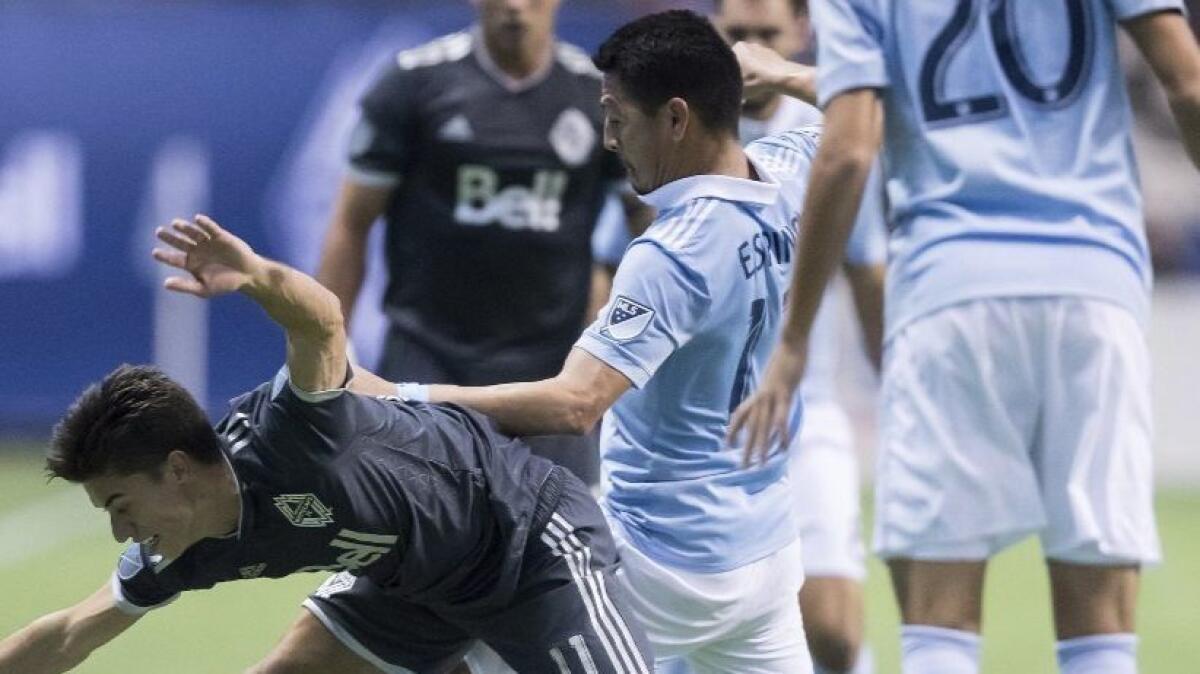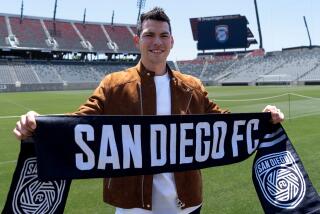MLS offers both haven and hope for Latin American players

- Share via
Roger Espinoza was 12 when he and his parents moved from Honduras to Colorado, leaving behind a country that was poor but hopeful as it struggled to complete the transition from dictatorship to democracy.
Twenty years later, 60% of Hondurans live in poverty, while crime, drug trafficking and murderous gangs have combined to make the Central American country one of the world’s most dangerous — one people are now fleeing on foot.
“It is hard knowing that your family is in a tough situation,” said Espinoza, a Sporting Kansas City midfielder who has relatives in San Pedro Sula, long ranked among the deadliest cities on the planet. “I talked to some teammates about the whole situation. It’s tough, all the violence and people dying every day.”
But, Espinoza continued, “it’s happening in Africa. It’s happening in the Middle East. It’s happening in Asia. It’s happening everywhere.”
That is having repercussions in soccer, the most international of sports and one in which many locker rooms have become miniature versions of the United Nations.
Two-thirds of the players in the English Premier League were born outside England, for example, while MLS started the season with players from 72 countries, making it the most diverse league in any sport in the world. The Los Angeles Football Club alone had players from 19 countries and five continents on its inaugural roster.
And sometimes what’s going on at home follows those players to work.
“While I don’t think there is a lot of talk, there is empathy,” said Alexi Lalas, who has been involved in MLS as a player, executive and broadcaster since the league’s first season. “Players have long recognized and respected that some of their teammates have faced challenges and situations that most of us never had to deal with.”
As a result, those locker rooms can become important sanctuaries where players find refuge. In public, however, they must often walk a fine line, aware that critical comments about the situation in their countries can mean trouble for family and friends back home.
Former LAFC defender Omar Gaber, a member of Egypt’s World Cup team, chose his words carefully when speaking about his country, one ruled by ex-military strongman Abdel Fattah Sisi. Atlanta United’s Josef Martinez, a Venezuelan, has been more open in his opposition to Nicolas Maduro, the leftist leader running that country. But even Martinez quickly took down an Instagram post that paired Maduro with the word “assassin.”
“I suffer because my family still lives there,” Martinez, who broke the MLS regular-season record with 31 goals this year, told the Guardian last month. “But I can’t come out and say what I think because I don’t live there.”
The crisis in the South American country, which is suffering from record violence and deprivation, led D.C. United’s Junior Moreno and five other Venezuelans to follow Martinez to MLS last winter, with Moreno playing in 20 games to help D.C. United to the Eastern Conference playoffs.
On Dec. 8, Martinez and Atlanta United will play in the MLS Cup final against the Portland Timbers and Diego Valeri, last season’s league MVP. Valeri brought his family to Portland five years ago after four men in his native Argentina held a gun to his throat, demanding his wallet and cellphone before driving away in his BMW.
“That was a big reason why we decided to leave,” Valeri told the Oregonian. “I talked with my wife and we decided if the opportunity was there, we would leave the country.”
“In all countries, criminals exist, but the violence in Argentina is the worst thing,” said Valeri, who scored twice in last Thursday’s Western Conference semifinal win over Espinoza and Sporting Kansas City. “To get maybe a backpack or a bicycle, they can kill you.”
Valeri isn’t the only Latin American player who saw MLS as a haven; the league started 2018 with 130 players from Latin America on its 23 teams, including 23 from Argentina and nine each from Honduras and Venezuela. And many of them made major contributions, with Argentines Luciano Acosta (D.C. United), Maximiliano Moralez (New York City) and Alejandro Romero Gamarra (Red Bulls) all ranking in the top seven in MLS in assists while Venezuelan newcomer Alejandro Fuenmayor and three Honduran national team players combined to give the Houston Dynamo its first U.S. Open Cup title this fall.
“There is a growing appreciation that MLS can often offer a better life on and off the field and one that is becoming more and more attractive to foreign talent,” Lalas said. “When you hear about some of the challenges [players] have faced, it puts your problems in perspective.”
Some don’t bother waiting for MLS to call. Last month 12 teenage players from Cuba opted to stay in the U.S. rather than return to their island homeland following the CONCACAF U20 Championships in Florida.
For those who don’t play soccer, the escape routes are more limited. This fall, as he was finishing a career-best MLS season, Espinoza followed the progress of a migrant caravan that began in San Pedro Sula, not far from his boyhood home, and ended in Tijuana, where many hoped the gang violence and intimidation they experienced in Honduras would earn them asylum in the U.S.
“We all know there’s a problem in Latin America. It’s not just Honduras,” said Espinoza, 32, who appeared in 53 games for the Honduran national team and represented the country in the 2012 Olympics and the 2010 and 2014 World Cups. “Trust me, everybody loves their country.
“But it’s very difficult to survive there, and that’s why people are coming.”
kevin.baxter@latimes.com | Twitter: @kbaxter11
More to Read
Go beyond the scoreboard
Get the latest on L.A.'s teams in the daily Sports Report newsletter.
You may occasionally receive promotional content from the Los Angeles Times.







